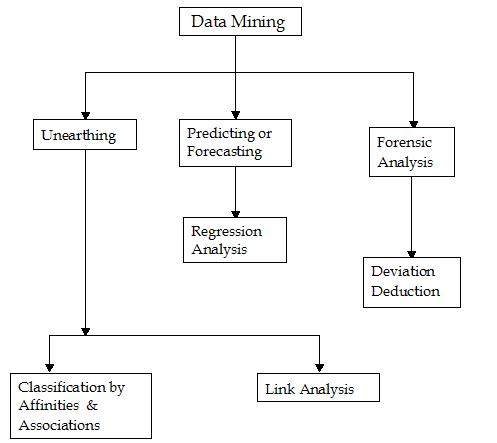Power CRM through Data Mining
Data Mining – The Technology
------------------------------------------------------------------
So let us see how Data mining can aid in building intelligence that can aid in
customer relations. Consider the example of a super market. Lets assume that the super
market stocks numerous products such as departmental and other food items, household
every day necessities, also fancy items, gift articles, stationery and even toys for
kids. Lets use this same example for understanding the various functions of data mining.
A very basic level process diagram of data mining can drawn as below

Lets understand the various terms present in the chart.
1) Unearthing
Unearthing is the process of looking in a database to find hidden patterns without
a predetermined idea or hypothesis about what the patterns may be. Unearthing is a
process where many unknown and essential information are derived out, these are called
as intricate patterns.
For example, through a constant observation of a group of
customers having similar age & profession, the likes and dislikes, the color and
price preference for that particular group of customers can be found out to a
certain percentage of success.
Classification through associations and affinities:
Classification is a process that maps a given data item into one of the several
predefined classes. Classification is done for various purposes like customer behavior prediction, Product and customer categorization.
For e.g. with respect to sales, if customers' yearly income is Rs.30000 to Rs.54000,
then their education level is till high school with 25 percent support and 90
percent confidence. Support means that 25 percent of the sales are made to customers
who have yearly incomes of Rs.30000 to Rs.54000 and an education level of high school. Confidence means that in 90 percent of the sales to customers with yearly incomes of
Rs.30000 to Rs.54000, the customers will have a high-school education. This rule could
have significance if it is determined that the high-school customer profile had a
significant profit potential and if it is required to do some target marketing. However,
if any demographic information concerning education level is not available, but
demographics related to incomes is available, then the knowledge of the affinity
(predictability) between income and education can be used to indirectly target the high-school customers on the basis of income rather than education level.
Classification will also be helpful in product development and also in many sales
promotion ideas. For example suppose the Super market allows customers to buy products
on credit and repay in installments. The super market will definitely extend this to
only those customers who are likely not to default based on the characteristics of past
defaulters and regular re-payers. This classification then allows the customers to buy
on credit.
Link Analysis:
Link analysis seeks to establish relationship between items or variables in a database
record to expose patterns and trends. Link analysis can also trace connections between
items of records over time. The most important link analysis application in CRM is
called market basket analysis, it is an operation that seeks relationships between
product items characterizing product affinities or buyer preferences.
Market Basket analysis:
This is one of the most familiar types of analysis for marketing, as explained before the purpose of which is to determine what products customers purchase together.
For e.g.) A sale of a walkman might most likely initiate a sale of a Battery charger,
or a sale of a new shirt might most likely initiate the sale a tie. These affinities
between the products help in classifying the products. A store could use this
information to physically locate products. Products that have a strong affinity can
be placed physically apart, creating a walking route past those products with a weaker
affinity and hopefully creating the opportunity for consumer temptation to buy the weaker-affinity products. Products with a weaker affinity can be placed physically
proximate because it's unlikely a shopper would cross the store for the item with
weaker affinity.
Next page
HOME|Page 1|Page 2|Page 3|Page 5|Page 6|Page 7|Page 8